unit5 I'm watching TV.(period1)
《I’m watching TV》PPT课件

now. 3.----_I_s_he c_l_e_a_n_i_n_g_(clean) the room?
----No,he isn’t. 4.Tom_i_s__p_l_a_y_i_n_g(play)the piano in the
room.Please ask him to come here. 5.Listen! They_a_r_e__s_i_n_g_i_n_g_(sing)in the
classroom.
句型转换 1.I am watching TV.(否定句)
I am not watching TV. 2.She’s opening the box now.(一般疑 问句)
What are they doing? They are listening to music.
What are you doing? I am writing.
What are you doing? I’m using the computer.
What are you doing?
I’m making soup.
leaving coming arriving dancing
动
词 shop
现 get
在 分
begin
词 swim
变 run 化
cut
shopping getting beginning swimming running cutting
Exercise
What is he doing? He__is__sw__im__m__in_g__.
A. is watching B. are watching
新目标英语七年级下册第五单元第一课时说课稿
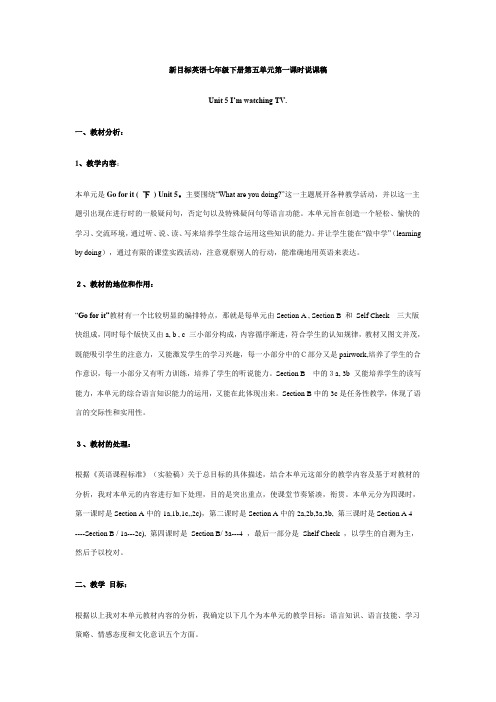
新目标英语七年级下册第五单元第一课时说课稿Unit 5 I’m watching TV.一、教材分析:1、教学内容:本单元是Go for it (下) Unit 5。
主要围绕“What are you doing?”这一主题展开各种教学活动,并以这一主题引出现在进行时的一般疑问句,否定句以及特殊疑问句等语言功能。
本单元旨在创造一个轻松、愉快的学习、交流环境,通过听、说、读、写来培养学生综合运用这些知识的能力。
并让学生能在“做中学”(learning by doing),通过有限的课堂实践活动,注意观察别人的行动,能准确地用英语来表达。
2、教材的地位和作用:“Go for it”教材有一个比较明显的编排特点,那就是每单元由Section A , Section B 和Self Check三大版快组成,同时每个版快又由a, b , c 三小部分构成,内容循序渐进,符合学生的认知规律,教材又图文并茂,既能吸引学生的注意力,又能激发学生的学习兴趣,每一小部分中的C部分又是pairwork,培养了学生的合作意识,每一小部分又有听力训练,培养了学生的听说能力。
Section B中的3a, 3b 又能培养学生的读写能力,本单元的综合语言知识能力的运用,又能在此体现出来。
Section B中的3c是任务性教学,体现了语言的交际性和实用性。
3、教材的处理:根据《英语课程标准》(实验稿)关于总目标的具体描述,结合本单元这部分的教学内容及基于对教材的分析,我对本单元的内容进行如下处理,目的是突出重点,使课堂节奏紧凑,衔贯。
本单元分为四课时,第一课时是Section A中的1a,1b,1c,,2c),第二课时是Section A中的2a,2b,3a,3b, 第三课时是Section A 4----Section B / 1a---2c), 第四课时是Section B/ 3a---4 ,最后一部分是Shelf Check ,以学生的自测为主,然后予以校对。
外研版(2024)英语七年级上册+Unit 5+Period 1 Understanding I
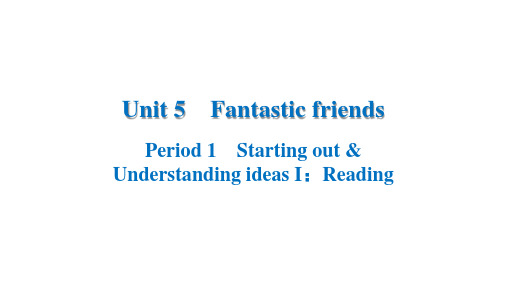
·英语
Ticketslts(成人):$20 9:00 am—4:00 pm
Children:$10
except(除了)Friday(10:00 am—3:00
Under 12:Free
pm)
Keep the zoo clean!
Do not touch(触摸),give food to or go near the animals.
Come and meet the Indian elephants and the new tigers from America.The bears are waiting to meet you, and you can also see the monkeys from China.The lovely dogs from Australia are waiting to laugh at you.The giraffes from Zambia are waiting to look down on you.
( A )24.A.like ( C )25.A.scary ( A )26.A.pets ( D )27.A.make
B.drink C.eat B.boring C.cute B.gifts C.animals B.have C.look
D.put D.big D.decorations D.take
C.so easily as
D.as easiest as
·英语
( B )14.—You look worried.What’s wrong?
—I went for a job interview (面试) yesterday and I
_______the result.
Period 1 (1a-1d)
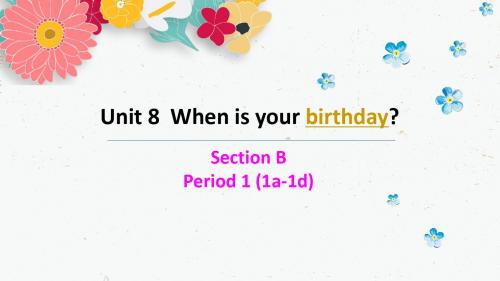
8. 四月五日
___A__p_r_il_5__th________
9. 五月八日
___M__a_y__8_th_________
10. 六月一日 ____J_u_n_e_1_s_t________
11. 九月十二日 _S_e_p_t_e_m__b_e_r_1_2_t_h____
12. 十一月二十日 _N__o_v_e_m_b_e_r__2_0_th_____
Dialogue 1
A: When is the basketball game? B: It’s on October 2nd.
Dialogue 2
A: When is the school trip? B: It’s on September 26th and 27th.
Dialogue 3
。
game
。
。
1c Listen again. Fill in John’s calendar.
September
24 25 26
27 28 29
30
school school trip trip
English test
October
12
3 45
67
basketball game
Sally’s birthday party
When is the basketball game?
When is Sally’s birthday party?
It’s on October 2nd.
It’s on October 5th.
根据汉语提示完成句子。
1. 这些是简和琳达的T恤衫。
These areJ_a_n__e_’s_ and _L__i_n_d_a_’_s T-shirts.
Unit 5 Period 1 Grammar 一般过去时精讲-六年级英语上册精品课堂(牛津上海版)

考点03:一般过去时的结构
Judy is a police officer now.
Judy was a little bunny before.
考点01:一般过去时的用法
He had lunch just now.
She read newspapers yesterday.
用法二:表示过去某一段时间发生的动作或过 去一段时间内经常或反复发生的动作。
考点02:一般过去时的时标
1. yesterday系列 ”昨天“ yesterday(morning/afternoon/evening…) the day before yesterday
考点03:一般过去时的结构
行为动词的一般过去时: 肯定句:主语+动 词的过去式+其他。
行为动词 过去式
She I They
danced played the piano swam
yesterday. five hours ago. three days ago.
即学即练
依时定态 依态定型
√1. She __li_v_e_d__(live) in Beijing last year. √2. There _w__a_s_(be) no one here a moment ago. √3. I listened but __h_e_a_r_d__(hear) nothing.
考点03:一般过去时的结构
I am a police officer now.
Unit_5_Our_new_home(Period_1)教学设计
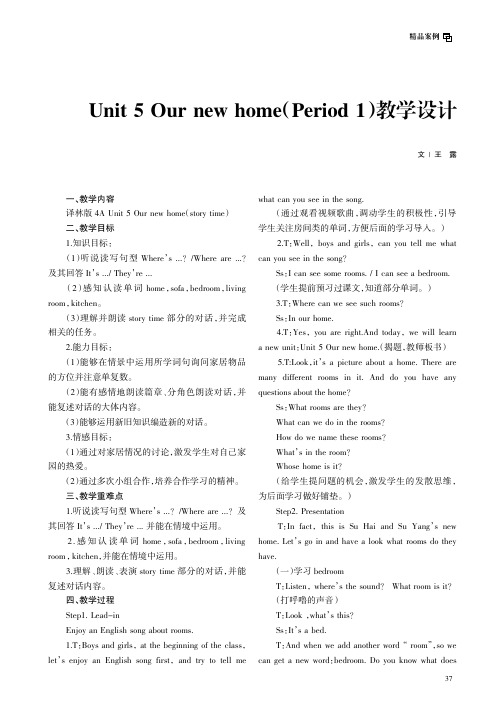
精品案例Unit5Our new home(Period1)教学设计文|王露一、教学内容译林版4A Unit5Our new home(story time)二、教学目标1.知识目标:(1)听说读写句型Where’s...?/Where are...?及其回答It’s.../They’re...(2)感知认读单词home,sofa,bedroom,living room,kitchen。
(3)理解并朗读story time部分的对话,并完成相关的任务。
2.能力目标:(1)能够在情景中运用所学词句询问家居物品的方位并注意单复数。
(2)能有感情地朗读篇章、分角色朗读对话,并能复述对话的大体内容。
(3)能够运用新旧知识编造新的对话。
3.情感目标:(1)通过对家居情况的讨论,激发学生对自己家园的热爱。
(2)通过多次小组合作,培养合作学习的精神。
三、教学重难点1.听说读写句型Where’s...?/Where are...?及其回答It’s.../They’re...并能在情境中运用。
2.感知认读单词home,sofa,bedroom,living room,kitchen,并能在情境中运用。
3.理解、朗读、表演story time部分的对话,并能复述对话内容。
四、教学过程Step1.Lead-inEnjoy an English song about rooms.1.T:Boys and girls,at the beginning of the class,let’s enjoy an English song first,and try to tell me what can you see in the song.(通过观看视频歌曲,调动学生的积极性,引导学生关注房间类的单词,方便后面的学习导入。
)2.T:Well,boys and girls,can you tell me what can you see in the song?Ss:I can see some rooms./I can see a bedroom.(学生提前预习过课文,知道部分单词。
Unit5 I’m watching TV period 1课件

reading
talking on the phone
taking a shower
eating breakfast
watching TV
running
dancing
playing the trumpet
swimming
playing the guitar
painting
sleeping
Grammar:现在进行时的含义与构成
What is he doing? He is playing basketball.
What is he doing? He is eating breakfast.
What is he doing? He is running.
What is he doing?
He is getting up.
being
eating reading swimming opening
see
talk run begin listen
open
paint
pai句: 主语+be +v-ing+其它. 如: I am reading a book. 2).否定句:直接在be后加not. 如:I am writing. I am not writing. 3).一般疑问句及回答:问句,be提前。 肯定回答:Yes,主语 +be 否定回答: No,主语+be+not --Are you drawing ? --Yes,I am./No, I’m not.
I.用括号里的动词适当形式填空
Is 1.--___Jim having (have) lunch now? --Yes he is. are playing 2.look,they __________(play) Soccer.
外研选二 Unit 5 教材基础练(period 1)

选二Unit 5单元基础练Period 1 Starting out & Understanding ideasⅠ.核心单词——写其形1. _______________ adv. 显著地2. _______________ n. 栖息地3. _______________ adv. 后来,随后4. _______________ n. 胃口,食欲5. _______________ v. (使)大大增加,(使)倍增6. _______________ n. 大混乱;紊乱7. _______________ n. 保护8. _______________ n. 病毒9. _______________ v. (使)变小,(使)减少10. _______________ n. 夹子,陷阱11. _______________ n. 离开12. _______________ v. 突然增加13. _______________ v. 倒坍;塌下14. _______________ adj. 大量的,多的15. _______________ n. 事件16. _______________ n. 干预,介入17. _______________ v. 应该做;对……负有……的义务18. _______________ n. 生态Ⅱ.拓展单词——通其变1. dramatically adv.显著地→____________ adj.突然的;戏剧性的2. inhabitant n. 栖居的动物→____________ v.居住于,栖居在→____________ adj.适于居住的;可居住的,可栖居的3. erosion n. 侵蚀→____________ v.侵蚀,腐蚀4. subsequently adv. 后来,随后→____________ adj.随后的,接着的→____________ n.随后;接着(尤指结果、效果)5. conservation n. 保护→____________ vt.保护;保存,保藏→____________ n.(自然环境、野生动植物等)保护主义者6. trap n. 夹子,陷阱→____________ adj.受困的,受限制的7. departure n. 离开→____________ v.启程,出发8. immunity n. 免疫力→____________ adj.免疫的;不受影响的;免除的,豁免的9. explode v. 突然增加;爆炸→____________ n. 爆炸→____________ adj.易爆炸的,易爆发的10. intervention n. 干预,介入→____________ v.干预,干涉;插话11. ecology n. 生态→____________ adj.生态的;生态学的→____________ adv.从生态学的观点看→____________ n.生态学者;生态保护论者Ⅲ.阅读单词——晓其意1. halfway adj. _________________________2. heritage n. _________________________3. inhabitant n. _________________________4. penguin n. _________________________5. rat n. _________________________6. vegetation n. _________________________7. erosion n. _________________________8. parakeet n. _________________________9. immunity n. _________________________10. postscript n. _________________________11. pest n. _________________________Ⅳ.核心语块——明搭配1. _____________________与……和谐相处2. _____________________占据;掌管3. _____________________产生对……的食欲4. _____________________被引进5. _____________________反过来;转而;轮流,依次6. _____________________导致7. _____________________失去控制8. _____________________提出9. _____________________把……从……去除/移走10. _____________________从……下降到……11. _____________________结果,因此12. _____________________结果是,证明是13. _____________________大量的14. _____________________最终地;最后地;彻底地;一次了结地15. _____________________ 归功于……;归咎于……Ⅴ.经典句式——会运用1. 翠绿的草地和光秃秃的岩石形成鲜明的对比,给人一种野性和自然美。
人教版七年级下册英语作业 Unit 5 Period 1(1a—2c)
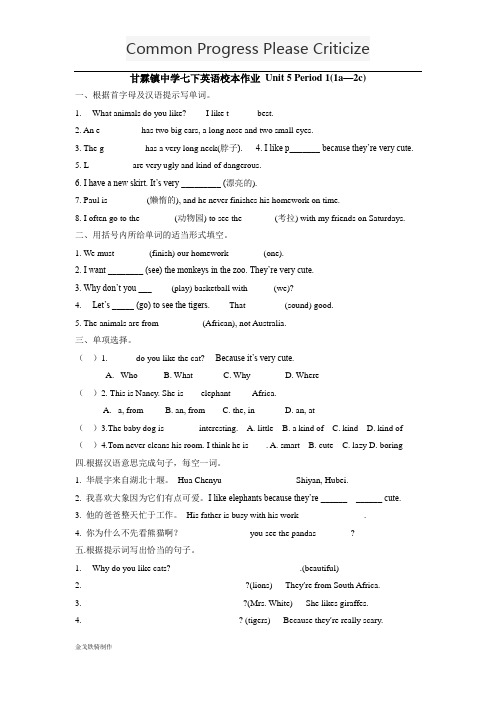
甘霖镇中学七下英语校本作业Unit 5 Period 1(1a—2c)一、根据首字母及汉语提示写单词。
1. ---What animals do you like? --- I like t______ best.2. An e_________ has two big ears, a long nose and two small eyes.3. The g_________ has a very long neck(脖子).4. I like p_______ because they’re very cute.5. L________ are very ugly and kind of dangerous.6. I have a new skirt. It’s very _________ (漂亮的).7. Paul is ________ (懒惰的), and he never finishes his homework on time.8. I often go to the _______ (动物园) to see the _______(考拉) with my friends on Saturdays.二、用括号内所给单词的适当形式填空。
1. We must _______ (finish) our homework _______ (one).2. I want ________ (see) the monkeys in the zoo. They’re very cute.3. Why don’t you _______ (play) basketball with _____ (we)?4. ---Let’s _____ (go) to see the tigers. --- That ________ (sound) good.5. The animals are from _________ (African), not Australia.三、单项选择。
Unit 5 period 1(讲座)

Homework
Make up a conversation with the new words and expressions , write it down and recite it .
Thank you! Good-bye!
Unit 5
Do you want to watch a game show?
Do you want to watch TV?
channel 1
channel 2
channel 3
channel 4
channel 5
channel 6
What do you want to watch?
news
sports show
What kind of TV show is it? It’s a sports show. What do you think of it? I can’t stand it.
talent show
What kind of TV show is it? It’s a talent show. What do you think of talent show? It’s wonderful. I love it.
Animal World
A: What do you want to watch? B: What do you think of …? A: They’re ..., I … them. And you? B: Well,I like…, because I think … B: Then let’s watch …
soap opera
What kind of TV show is it? It’s a soap opera. What do you think of it? It’s OK.I don’t mind it.
Unit5 TV Shows(教案)人教新起点版英语五年级上册

Unit 5 TV Shows(教案)人教新起点版英语五年级上册一、教学目标1.了解电视节目的种类及其特点。
2.能够谈论自己喜欢的电视节目,并表达原因。
3.能够运用所学语言,与同伴们展开谈话。
二、教学重难点1.掌握电视节目的种类及其特点。
2.解决孩子们在谈论自己喜欢的电视节目时,难以找到合适的表达方式。
三、教学准备1.制作电视节目分类表。
2.制作小组讨论表格。
3.制作游戏道具。
四、教学过程1. Warming Up1.教师出示不同电视节目的图片,让学生猜测其名称,并简单介绍每个节目的主要内容。
2.通过这个环节,引导孩子们了解电视节目的种类,并增强他们的兴趣和参与度。
2. Presentation1.教师出示分类表,以不同的分类方式向学生展示不同类型的电视节目。
2.通过这个环节,让学生更全面地了解电视节目的种类和特点,并为他们后续的讨论活动提供基础知识。
3. Practice1.运用小组讨论表格,教师引导学生们分组,为自己喜欢的电视节目展开讨论。
2.学生们在小组内展开谈话,除了表达自己的观点,还需要注意听取同伴的意见,并进行讨论和辩论。
3.这一环节的重点在于让孩子们积极参与,展示并运用所学语言,以及与同伴们进行交流,不但可以锻炼孩子们的口语表达能力,更可以增强他们的团队合作意识和学习兴趣。
4. Production1.教师运用游戏道具,让学生在小组内进行答题比赛,巩固记忆并且提高学生们的兴趣。
2.通过这个环节的游戏,学生们可以运用到所学知识,巩固记忆,同时也能够锻炼他们的协作能力和应变能力。
5. Homework1.学生们回家后,要求他们观看选定的电视节目,并进行简单的心得总结。
2.这个环节不但可以激发孩子们观看更多有价值的电视节目的兴趣,也可以帮助他们进一步巩固所学知识。
五、教学反思1.由于小组讨论这个环节涉及到不少口语表达,为了确保每个孩子都能够充分表达自己的意见,教师在策划时需要对小组成员的数量、身份、性格等方面进行考量。
人教版七年级英语下册unit 5第五单元Period 1 Section A(1a-2d)

D. You're welcome.
【点拨】You're welcome.是回答Thank you.常用 答语,意思是不客气。
题组专训
3. —Look! Kangkang, that old man is crossing the
crosswalk. —Jane, let's ____D____ him. 【2020•铜仁】 【点A拨. 】he句lps意为“——快看!康康B,. t那o h个el老p 人正在过
让某人做某事。
题组专训
5. Not all the students like the book, because it is
____B____ boring.
A. a kind of
B. kind of
C. a kind
D. kinds of
【点拨】句意为“不是所有的学生都喜欢这本书, 因为它有点无聊”。kind of表示程度,意思是 “有点儿”。
【点拨】句意为“那家超市有各种各样的商品,但 是它们有点贵”。kinds of各种各样的; kind of 表 示程度,有点儿的意思。
课后巩固
一、根据句意及图片提示填写单词
1. —What animals do you like?
—I like __t_ig_e_r_s__
best.
课后巩固
2. An _e_le_p_h_a_n_t_ nose and two big eyes.
人教版 七年级下
Unit 5 Why do you like pandas?
Period 1 Section A(1a-2d)
习题链接
1 Africa
先练后背
提示:点击 进入习题
新人教版高一英语必修1-Unit 5 Period1Listening and Speaking教案
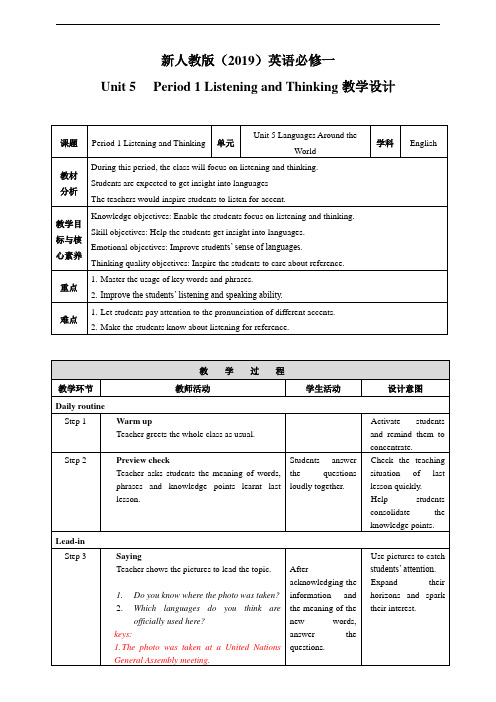
Pair work
Discuss the questions in groups.
Before you listen, match each photo with the correct country name.
keys:
342
615
Discuss which languages are spoken in these countries.
Skill objectives: Help the students get insight into languages.
Emotional objectives: Improve students’ sense of languages.
Thinking quality objectives: Inspire the students to care about reference.
Step 9
Discussion
Teacher shows the topic and gives students examples to discuss.
Work in pairs or groups. Discuss which other language(s) you want to learn and why.
-Check the teaching situation of last lesson quickly.
-Help students consolidate the knowledge points.
Lead-in
Step 3
Saying
Teacher shows the pictures to lead the topic.
Unit 5 Period 1 Listening课件-高中英语(人教版2019必修第三册)

Is money the basis of a happy life? Why or why not?
love health respect family knowledge friendship ... ...
material needs
spiritual needs
Quote
Money is quite useful as a help for us to get what we need.
after CMhaen told him about her situation.
4. Listen again and fill in the blanks .
(
police station interview
5,000
owner wrong
savings
100,000
website
Listening text
apartment building
4. Liu Xia
D. Chen’s 16-year-old daughter
When __L_a__s_t_T_u__e_s_d_a__y_m___o_r_n_i_n_g_____
Where At__T_a_iy_u__a_n_R__a_il_w__a_y_S_t_a_t_io_n_
Recently, a cleaner by the name of Chen Liyan has made the headlines for her generous and honest act. The 45-year-old Chen was sweeping the floor at Taiyuan Railway Station early last Tuesday morning when she found a small plastic bag near a chair and discovered 100,000 yuan inside. Chen was shocked but she was determined to return the money to its owner. When interviewed by the local paper yesterday, Chen said, “I would have felt bad if I had kept the money. After all, the owner might have needed it badly.” While working, Chen watched carefully for anyone who might have been the owner. She waited for over two hours,but having no luck, she went to the nearest police station to turn the money in. There, it was finally returned to its owner. Wang Zheng. Wang thanked Chen repeatedly and apologised for the inconvenience, even offering her 5,000 yuan as a reward. To his surprise, however, Chen refused, believing that it would be wrong to accept money that she had not earned. But what is even more surprising, perhaps, is that Chen’s daughter, 16-year-old Liu Xia is currently seriously ill. Chen had already spent the last of her savings on the ongoing treatments and has also taken out a large loan. Fortunately, Ma Dongbao, who works at the police station, stepped in. Living in the same apartment building as Chen’s family, Ma was well aware of Chen’s difficulties. When Wang was told about Chen’s situation, he decided to set up a fundraising website to pay for Liu’s hospital bills. Chen Liyan’s example shows a different way of thinking about money. Money is important, but to people like Chen, it definitely isn’t everything. And that’s a great attitude to take. Now, in other news, one city in …[Fade out.]
人教版七年级下册英语Unit 6 Period 1 Section A(1a-2d)
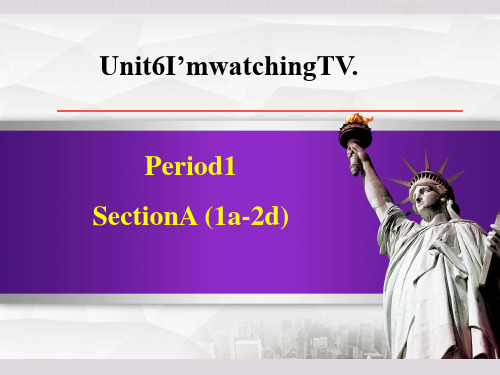
2cRole-playtheconversationin2b.
2dRole-playtheconversation.
Jenny:Hello? ThisisJenny. ⑥ Laura:Hi, Jenny. It'sLaurahere. Jenny:Oh, hi, Laura. Whatareyoudoing? Laura:Notmuch. ⑦I'mjustwashingmyclothes. Whataboutyou?
返回
中考在线2:根据句意及所给的首字母提示, 补全单词。 It’sagoodhabittowhandsbeforemeals. [海南]
ash
⑤Doyouwanttogotothemovies?
gofishinggo去to钓th鱼emgooshvoiepsp去ing看去电购影物 单数形式:gotoamovie
2bListenagain. Fillintheblanks.
Jack: Hello, Steve.
Steve: Hi, Jack.
Jack: Whata_re______ dyooiung________, Steve?
Steve: I'mw_a_tc_h_in_g_T_V_______. What about
you? listeningtoaCD
boring
Jack: I'm _________________, biunteirte'sstkiningd of _________. goto Steve: Yeah, my TV show is also not very ___________.
Do you want to ______ the movies?
八年级英语上册Unit5Period1SectionA1a_2d习题课件鲁教版五四制

返回
10. [2023 成都] Some plants grow ___d_e_ep___ (deep) into the earth to get water.
返回
三、 从方框中选择合适的单词,并用其适当形式填空 desert, protect, tour, ancient, wide
返回
Bears, lions and other animals move quietly through 31 . They cannot be easily seen by hunters. ( A )31. A. forests B. rivers C. leaves D. parks 【点拨】根据“move quietly through”可知是从森林里穿过, 故选A。
返回
desert, protect, tour, ancient, wide 15. Green Street is the __w_i_d_e_s_t_ of all the streets in our city.
Five cars can run on it side by side. 【点拨】根据后句“五辆小车能在其上并排行驶”可知, 格林大街是我们市里最宽的大街。故填widest。
返回
四、 根据汉语意思完成句子 16. 请随意和我聊聊吧。 ___F_e_e_l__ ___f_re_e___ to chat with me, please.
返回
17. [2023 荆州] 几年前,成立这个小组是为了保护濒危野生 动物。 A few years ago, this group was set up ____t_o___ _p_r_o_t_e_c_t _ endangered wild animals.
一节英语课的教学设计综述--Unit 5 I'm watching TV(Period 1 Section A)

教 师 提 问 : a oy u u u l o o u d y? I h W td o sal d n S n a s y
话 题展 开 引 出现在 进 行时 , 围绕本 时 态训 练学 生 的 听 、 并 说 、 、 能 力 , 后 让 学 生 自己归 纳 总 结 现 在进 行 时 的 读 写 最 构 成 及现 在 分词 的构成 。 2 教学 目标 . () 识 目标 1知
短 语 :aigdn e,e dn ,akn nte h n , on et in rra ig t igo o e d ig n l hp
V l5 (0 1 o . 2 1)
No 1 P1 一P1 2 . 51 5
一
节英语课的敏学设计综述
Un t5 I m t h n V( r o e to i ’ wa c i gT Pe i d 1S c i n A)
胡 颖 焰
摘要 : 本文对 一节英语课 的教 学设 计进行 了详 细的介 绍 , 旨在与 同行 交流教 学经验 , 更好地 开展 英语教 学。 关键 词 : 语教 学 ; 材 分析 ; 学设 计 英 教 教
c mmu i a i e c mp t n e o n c tv o ee c
I m la ig te b ad ’ ce nn r . h o W e’eh vn gih ca s r a ig En l ls . s
语 法 : 在 进行 时 的构 成 及现 在 分 词 的构 成 。 现 f) 力 目标 2能
l tnn i , i n i , e dn i , p a igs i , i e i g kl wrt gs l ra igs l s e k n kl s s i kl kl l
- 1、下载文档前请自行甄别文档内容的完整性,平台不提供额外的编辑、内容补充、找答案等附加服务。
- 2、"仅部分预览"的文档,不可在线预览部分如存在完整性等问题,可反馈申请退款(可完整预览的文档不适用该条件!)。
- 3、如文档侵犯您的权益,请联系客服反馈,我们会尽快为您处理(人工客服工作时间:9:00-18:30)。
翻译句子。 翻译句子。 变为否定句和一般疑问句
1.男孩子们正在踢足球 男孩子们正在踢足球. 男孩子们正在踢足球 The boys are playing soccer. 2.她正在吃午餐 她正在吃午餐. 她正在吃午餐 She is eating lunch. 3.我正在玩电脑游戏 我正在玩电脑游戏. 我正在玩电脑游戏 I am playing computer games. 4.安静!我们正在上课。 安静! 安静 我们正在上课。 Be quiet! We are having class.
6.These days Tomis writing ____
(write) a book.
What are your family doing?
7.-Where is your father? -He is reading a _____ (read) newspaper in the room. 8. Be quiet! The baby(婴儿 婴儿) 婴儿 ________ (sleep)! is sleeping 9. My family are watching TV. (画线提问 画线提问) 画线提问
陈述句结构
主语+be+V.+ing 主语正在…
用单词的适当形式填空
1.He oftenwatches _____(watch) TV. is watching 2.He ______(watch) TV now. 3.Look! Tomis dancing _____(dance). 4.Listen! Whois singing _____(sing)? 5.It’s 8:00.The students are having __(have) an English class.
Play a game 请你上来表演动作, 请你上来表演动作,全 班同学问,你来回答。 班同学问,你来回答。
What is he doing? 他正在做什么? He is watching TV. 他正在看电视。
A:What is he doing? B: He is…
playing soccer
painting
请看书25面的图片,用图bdef互相 提问
A:What is he doing? B: He is… b: cleaning d : doing homework e : talking on the phone f : reading
What is she doing? 她正在做什么? She is reading. 她正在看书
Pair work:
A: What is she doing ? B: She is …ing .
cleaning eating dinner
A: What is she doing ? B: She is … .
talking on the phone
running
swimming
What are they doing? 他们正在做什么? They are swimming. 他们正在游泳。
Unit 5 I’m watching TV
SectionA(1)
讲解作业
1.含义: 含义: 含义 表示现在(或一段时 表示现在(
间内) 间内)正在发生或进 行的动作。 行的动作。常于 now连用 连用。 now连用。 2.构成: 2.构成: 构成 +Vbe +V-ing
现在分词变化规则: 现在分词变化规则
A: What are they doing ? B: They are …ing .
watching TV talபைடு நூலகம்ing
A: What are they doing ? B: They are …ing .
1b Listening
What are these people doing? Write numbers from 1a. A. Jenny __ 2 B. Dave and Mary __ 4 C. John __ 1
1. 在动词原形后直接加 ing 在动词原形后直接加-
2. 去不发音的 加- ing 去不发音的e加 3. 双写再加 ing 双写再加-
写出下列动词的ing 形式 形式. 写出下列动词的
helping coming 1.help_______ e______ eating swimming 3.swim______ 4.eat_______ giving 5.give_______ 6.talk ______ talking writing 7.run ________ 8.write______ running cleaning 9.clean______ 10.play__ ____ playing
watching • A: Jenny is _________ TV eating dinner • B :Dave and Mary are _________ • C :Jhon is _________ homework doing his
特殊疑问句结构
What+ be+ 主语+ doing? 主语正在干什么?
